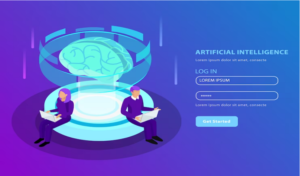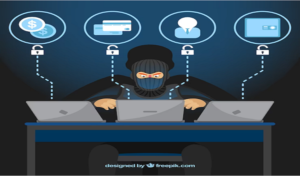Understanding the psychology behind cybercrime

In our highly advanced world, cybercrime has become a constant danger. From phishing scams to hacking attacks, cybercrime can have terrible effects on both people and businesses. With hacking becoming more common in the United States, it’s important to understand the psychology behind it to stop it and lessen its effects.
Cybercrime is a human problem at its core. It is caused by things like greed, power, and control. Understanding the minds of hackers can help us spot and stop them from doing bad things. It can also help us learn more about how to keep ourselves safe from hacking. By understanding why and how cybercriminals do what they do, we can take steps to protect our internet activities and personal information.
In this blog post, we’ll talk about why people in the USA commit cybercrimes. We will talk about what hackers are like, why they do what they do, and how cybercrime affects its victims. We’ll also talk about how law enforcement investigates and prosecutes cybercrime, as well as what the future holds for this area. By the end of this piece, you’ll know more about what makes people commit cybercrimes and what you can do to protect yourself and your organisation. So let’s dive in and learn more about the interesting world of cybercrime psychology.
How hackers think and act
Cybercriminal psychology in the United States is a complicated topic that needs a deep understanding of how people act. Cybercriminals are different from other thieves because they have certain traits that set them apart. One of the most important things about hackers is that they act on impulse, which means they often do things without thinking about what will happen.
Cybercriminals also lack empathy, which makes it possible for them to do bad things without feeling bad or guilty about it. Cybercriminals also want to be powerful and in charge, which is why they do things like hacking, scams, and identity theft.
Some well-known hackers, such as Kevin Mitnick, Albert Gonzalez, and Gary McKinnon, show how these traits work. Mitnick was a skilled hacker who used his understanding of computers to break into corporate networks and steal sensitive data. Gonzalez was the brain behind the theft of millions of credit card numbers, and McKinnon broke into US government computer systems and caused millions of dollars in damage.
In conclusion, it’s important to know how hackers in the United States think in order to spot and stop their bad behaviour. By understanding what hackers are like and why they do what they do, we can protect ourselves and our organisations from cyber threats.
Why people commit hacking
Cybercrime in the United States can be caused by many different things, such as money, political or ideological beliefs, revenge, or wanting thrills. Cybercriminals are often most interested in making money, since they use their skills to steal money or valuable information. Cybercriminals may hack into government systems or organisations they don’t agree with because of their politics or views.
Cybercriminals also often do bad things because they want to get back at people or organisations they feel have hurt them. Last but not least, some cybercriminals do things just for fun. They like the task of hacking into secure systems.
There is a difference between hackers who are not professionals and those who are. Most amateur hackers want to make money, and they do things like phishing scams or ransomware attacks to make money quickly. On the other hand, professional cybercriminals are more skilled and often work in groups. They target bigger organisations and use more advanced methods.
In conclusion, it’s important to understand the different reasons why people commit cybercrime in the United States if you want to come up with effective ways to stop computer threats and deal with them when they happen. By knowing how amateur and skilled cybercriminals are different and what drives them, we can better protect ourselves and our organisations from cyber attacks.
Victimology
Victimology is a key part of understanding hacking in the United States. Cybercrime is most likely to happen to people and businesses that don’t have strong security measures in place, like old software or weak passwords. Cybercrime is also more likely to happen to small businesses and people who don’t have the money to invest in strong protection.
Victims of hacking can be hurt emotionally and mentally in a big way. People who have their personal information stolen often feel abused and helpless, and they lose faith in their own ability to keep their information safe. In some cases, the financial effects of hacking can be so bad that people lose a lot of money or even go bankrupt. As a result of the attack, victims may also feel emotional pain, worry, and depression.
It is important to understand the emotional and mental effects of hacking on victims and give them the help they need to get better. Cybercrime victims should get help from a professional to deal with any emotional or mental pain caused by the attack. Also, organisations and people can protect themselves from cyber threats by taking steps like putting in place strong cybersecurity means and staying aware of possible threats.
Prevention and punishment
Cybercrime needs to be stopped before it happens and stopped before it happens. People and businesses can avoid cybercrime in a number of ways, such as by using strong passwords and firewalls, running anti-virus software, and keeping an eye out for phishing attempts. Keeping software up-to-date and using two-factor login can also add extra layers of security.
Education and training about cybersecurity are very important for stopping hacking. Cyber attacks can be stopped by teaching workers about best practises for cybersecurity and teaching them how to spot possible threats. It’s important to create a culture of cybersecurity awareness and make sure that both people and organisations understand the risks of cybercrime and the steps they can take to protect themselves.
In the end, preventing and discouraging hacking in the US is very important. To avoid and deter cyber attacks, individuals and organisations should put a high priority on putting in place strong cybersecurity measures, staying aware of possible threats, and investing in cybersecurity education and training.
How law enforcement works
In the US, law enforcement is a key part of the fight against hacking. Cybercrime is looked into and prosecuted by law enforcement agencies. They do this by gathering proof, finding suspects, and building a case for prosecution. They work closely with experts in technology to find out where cyber attacks come from, get search warrants, and take electronic devices to study.
But researching and prosecuting cybercrime is hard for police and prosecutors for a number of reasons. One of the biggest problems is that hacking often happens in more than one place and can involve people from other countries. Because cybercrime is often done anonymously, it can be hard to find suspects and gather proof.
Even though these problems exist, law enforcement agencies are always getting better at stopping hacking. They are improving their forensic analysis and investigation methods and working with foreign partners to deal with the fact that cybercrime happens all over the world. It’s important to support and fund law enforcement’s efforts to fight cybercrime and make sure they have the tools and technology they need to successfully investigate and prosecute cybercriminals.
How hacking and psychology will change in the future
Cybercrime and psychology in the US are always changing, and so are their future trends. Cybercriminals are becoming more likely to use AI and machine learning. This is a new trend that presents a serious threat to both individuals and organisations. Criminals can use these technologies to automate attacks and get around standard security measures, which makes it hard to find and stop cybercrime.
In the future, changes in psychology and criminology may help stop and solve hacking. By learning more about what drives and defines cybercriminals, we can come up with better ways to stop and discourage cyber attacks. Also, improvements in forensic psychology can give important information about how hackers act and make decisions, which can help identify and prosecute them.
In the end, the future of cybercrime and psychology in the United States will require law officers, technology experts, and mental health professionals to work together. Staying up to date on new cybercrime trends and making progress in psychology and criminology study can help stop and solve cybercrime in the future.
Conclusion
In conclusion, it is important to understand the psychology behind hacking in the US if you want to stop it or lessen its effects. Cybercrime is becoming more of a problem, and it can hurt people and businesses both financially and emotionally. By knowing what drives cybercriminals and what makes them who they are, we can come up with ways to stop and deter cyber attacks.
In this piece, we’ve talked about different aspects of cybercrime, such as what cybercriminals are like, how victims are affected, how to prevent and stop cybercrime, the role of law enforcement, and what the future holds. We’ve talked about how important cybersecurity education and training are, how hard it is for law enforcement to investigate and prosecute cybercrime, and how important it is to keep up with new cybercrime trends and improvements in psychology and criminology.
It’s important to put cybersecurity first and take preventative steps to stop cyber threats. By learning about the psychology behind cybercrime and investing in cybersecurity education and training, we can protect ourselves and our organisations from the many risks that come with cybercrime. We need to work together to fight cybercrime and spread a mindset of cybersecurity awareness so that it has less of an effect on our lives and on society as a whole.
Read More You May Like:








